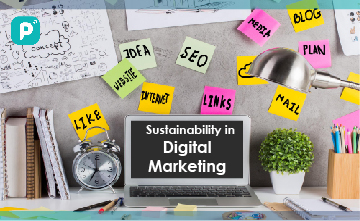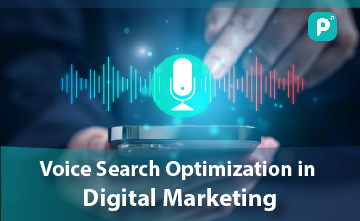Sustainability has become an increasingly important concept across all industries and sectors, including digital marketing. As consumers become more environmentally and socially conscious, brands need to focus more on sustainable practices in their digital marketing strategies. Implementing sustainability helps build consumer trust, attract talent, future-proof the business, and reduce costs over the long term.

This blog post will provide an overview of sustainability in digital marketing, explain why it matters for businesses today, provide tips for creating a sustainable digital marketing strategy, and highlight some of the latest sustainable best practices being implemented by top brands.
What is Sustainability in Digital Marketing?
Sustainability in digital marketing refers to the practice of creating and distributing digital content, running digital campaigns and managing social platforms in a way that has a neutral or positive impact environmentally, socially and economically. The goal is to reduce the carbon footprint, waste and resource use of digital activities to avoid harming the planet and its people now or in the future.
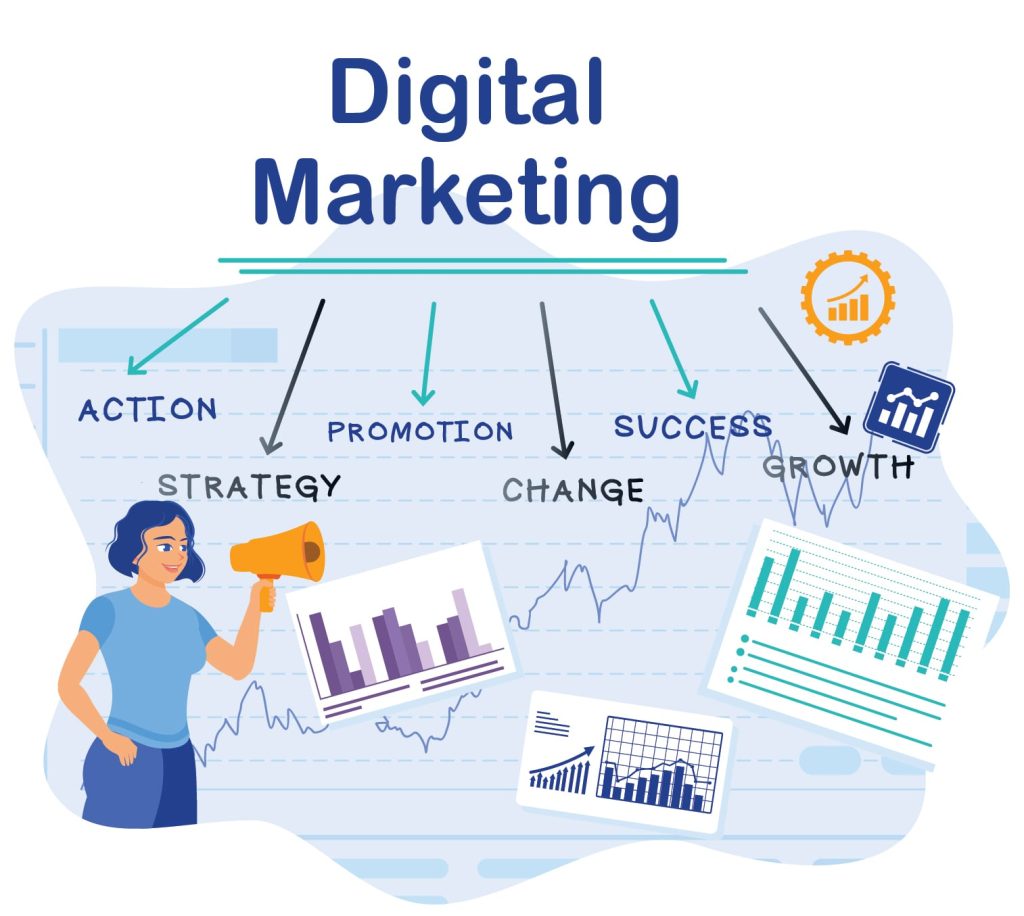
Elements of sustainable digital marketing include:
- Energy efficiency – Using renewable energy to power digital marketing activities as much as possible and working to reduce overall energy usage.
- Waste reduction – Minimizing paper and plastic waste in promotional materials and giveaways. Sending less physical junk mail.
- Ethical design – Employing web designers who utilize sustainable hosting platforms and follow green coding practices.
- Responsible messaging – Ensuring language and images promote sustainability without greenwashing. Tracking the genuine social/environmental impact being made.
- Data transparency – Allowing consumers to access their data easily and opt-out of communications. Making sure data collection processes respect privacy.
- Why Sustainability Matters in Digital Marketing
- With consumers becoming more conscious of the economic, social, and environmental implications of their purchases, brands that fail to make sustainability a priority risk damaging their reputation and bottom line. Research shows that 66 percent of consumers now expect companies to act sustainably.
Top Reasons Sustainability In Digital Marketing Matters
Here are four of the top reasons sustainability in digital marketing matters today:
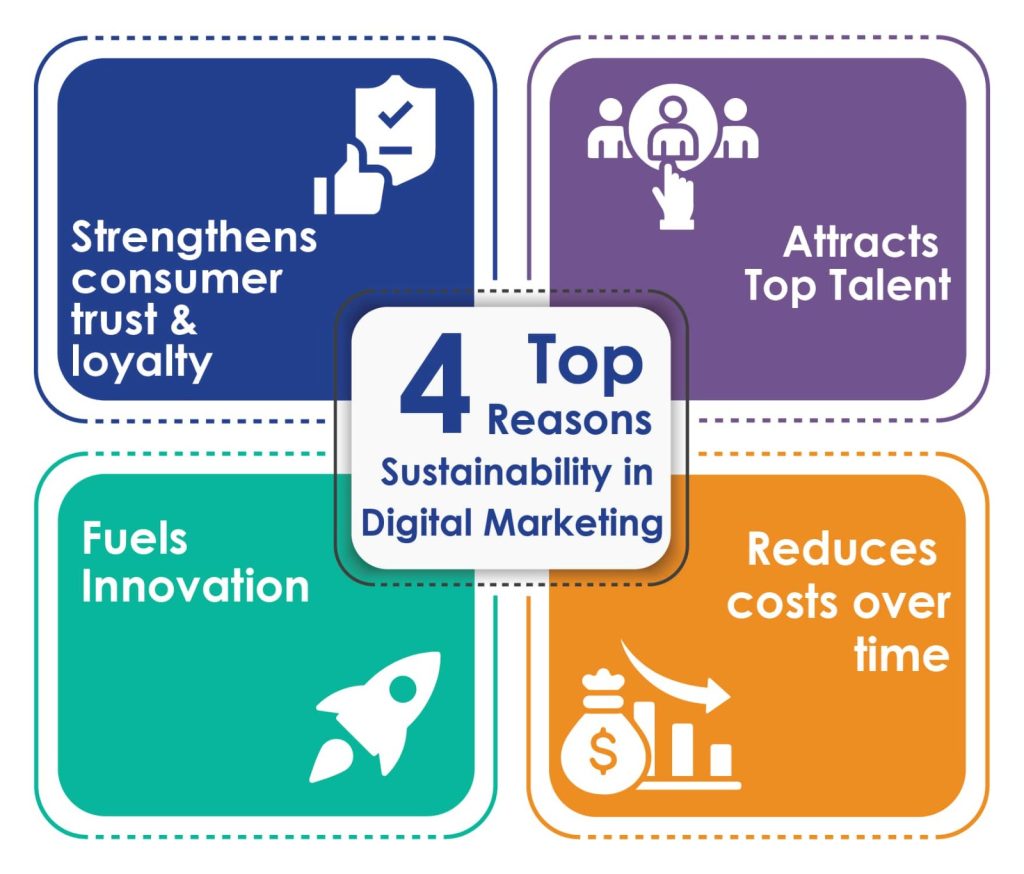
Strengthens consumer trust and loyalty
Over 50 percent of consumers say sustainability is important for deciding which companies they want to support. By touting genuine sustainable practices in their digital content and campaigns, brands can strengthen trust and build loyalty amongst these environmentally-minded consumers.
Attracts top talent
A company’s sustainability focus has become a key factor people look at when job searching. 72 percent of millennials say they would take a pay cut to work for a sustainable company. Having strong green credentials can give brands an edge when competing to recruit from this top talent pool.
Fuels innovation
The shift towards sustainability encourages brands to rethink processes and pioneer new technology. Sony recently unveiled the world’s first 100% recycled plastic paper, made entirely from post-consumer plastic and recycled paper fiber. These kinds of innovations will be what separates market leaders going forward.
Reduces costs over time
While sustainability requires some upfront investment, optimizing energy consumption and minimizing waste leads to significant cost savings down the road. Brands practicing sustainability for several years report efficiency gains of 15 percent or more.
Tips for Creating a Sustainable Digital Marketing Strategy
Here are six tips for brands looking to employ more sustainable practices in their digital marketing:
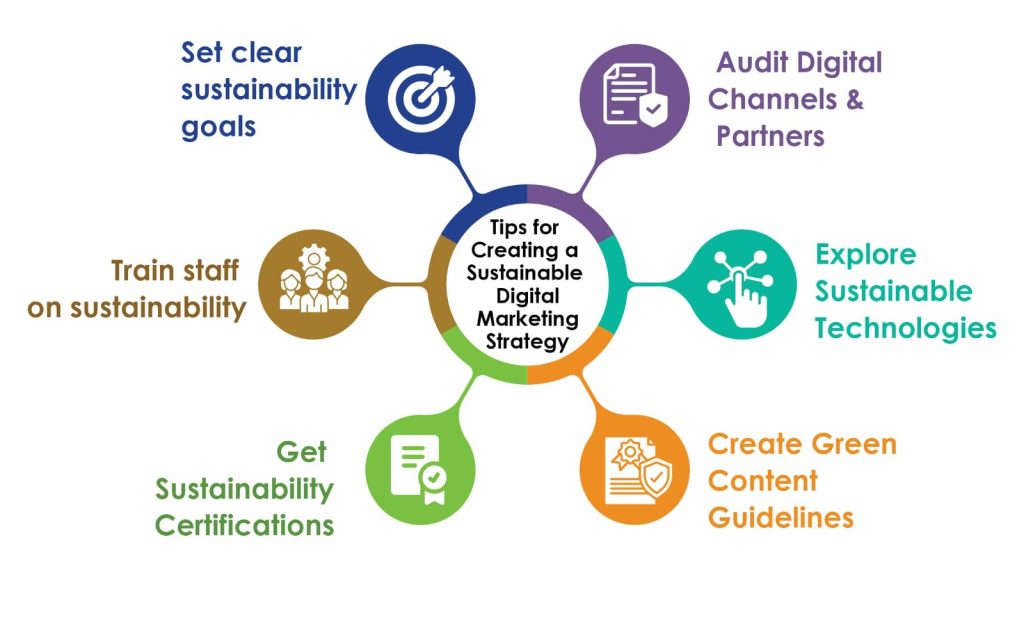
Set clear sustainability goals
Define specific targets around boosting energy efficiency by x amount, reducing paper usage in promotional materials by x percent etc. Track progress in hitting these goals quarterly or annually.
Audit digital channels and partners
Assess where energy and resources are being wasted currently in digital processes. Ensure third parties like web hosting services utilize renewable energy and have strong sustainability standards themselves.
Explore sustainable technologies
Shift digital tasks onto platforms built specifically for efficiency—for example, email service providers like SendinBlue offer carbon-neutral email sending. Look at adding things like solar panels or smart metering technology to measure and reduce energy usage.
Create green content guidelines
Brief teams internally on sustainability considerations for digital content production and distribution. Include tips on minimizing waste in video shoots, using graphics/images sparingly to optimize webpage size etc. Provide guardrails for avoiding greenwashing.
Get sustainability certifications
Have digital marketing activities audited by external sustainability organizations. Getting certified by bodies like the Carbon Trust and B Corps helps substantiate claims and builds credibility.
Train staff on sustainability
Educate teams across the organization on topics like ethical design thinking, green coding practices, sustainable sourcing partners etc. Encourage creativity in coming up with greener solutions.
Sustainable Digital Marketing Best Practices
Here are some award-winning recent examples of brands implementing innovative sustainability initiatives through their digital marketing:
Microsoft – AI for Earth
Microsoft launched the AI for Earth program to make climate-focused artificial intelligence tools available to organizations worldwide working on sustainability challenges. Their cloud computing services power a range of platforms performing tasks like tracking endangered species or monitoring deforestation.
Unilever – Green Web Hosting
Unilever partnered with green web hosting company Worldstack to move over 300 websites for brands like Dove onto renewable energy sources. They also optimized page sizes down 90% to cut server load energy waste.
IKEA – Buy Back Service Promotion
IKEA Canada ran a widespread digital marketing campaign promoting its sustainable Buy Back service, which buys old furniture from customers for resale. As well as driving 10x the usual store traffic, 300k+ video views showed strong consumer demand for sustainability initiatives.
Nike – Virtual Photography Studio
Nike opened a virtual photography studio in 2021 where products are digitally rendered for promotional shoots rather than shipping physical samples worldwide. This state-of-the-art online studio significantly reduces their carbon footprint and waste impacts.
Patagonia – WornWear Content
Outdoor apparel brand Patagonia creates educational content related to its WornWear program encouraging customers to repair rather than replace products. Their digital materials provide tips on mending existing Patagonia clothing alongside campaigns showcasing well-loved wardrobe items.
The Way Forward
As demonstrated by these examples and statistics, there is both rising consumer demand and a clear business case for brands to focus on implementing sustainability in their digital marketing. While getting more strategic about reducing environmental impacts does require some effort, brands that are proving themselves to be genuine sustainability advocates are reaping the rewards through stronger customer loyalty, top talent acquisition and future-proofed growth.
Transform your digital marketing game with our expert tips. Explore our blog for actionable strategies that deliver real results. Elevate your marketing efforts now!
All images belong to their respective owners. Please email [email protected] if removal is required.

